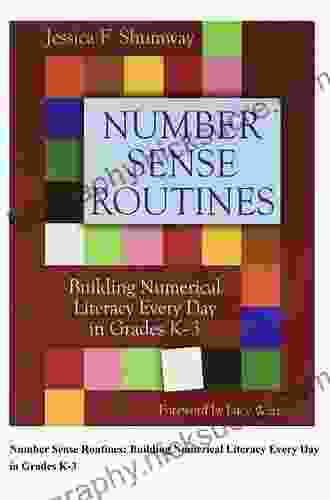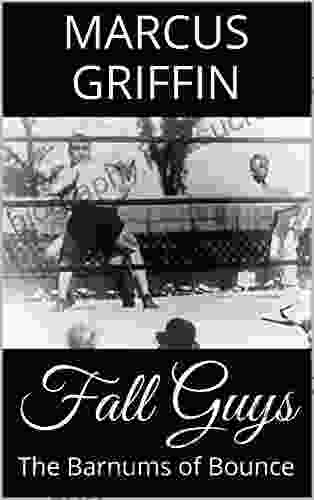Building Numerical Literacy Every Day in Grades

Numerical literacy is the ability to understand and use numbers in everyday life. It's a fundamental skill that helps us make informed decisions about everything from personal finance to voting.
Unfortunately, many students struggle with numerical literacy. A 2013 study by the National Center for Education Statistics found that only 37% of 8th graders were proficient in math. This lack of proficiency has serious consequences: students who are not numerate are less likely to graduate from high school, attend college, or earn good jobs.
4.6 out of 5
| Language | : | English |
| File size | : | 4207 KB |
| Text-to-Speech | : | Enabled |
| Screen Reader | : | Supported |
| Enhanced typesetting | : | Enabled |
| Word Wise | : | Enabled |
| Print length | : | 192 pages |
The good news is that numerical literacy can be taught and improved upon. By incorporating number-rich activities into our daily routines, we can help our students develop the skills they need to succeed in school and in life.
What is numerical literacy?
Numerical literacy is the ability to understand and use numbers in everyday life. It includes the following skills:
- Counting and reading numbers
- Understanding place value
- Solving simple math problems
- Applying math concepts to real-world situations
Numerical literacy is a key component of mathematical literacy, which is the ability to understand and use mathematics in a variety of contexts. Mathematical literacy is essential for making informed decisions about our lives, our communities, and the world around us.
Why is numerical literacy important?
Numerical literacy is important for a number of reasons. First, it helps us to make informed decisions about our personal finances. We need to be able to understand our paychecks, balance our checkbooks, and make wise choices about how to spend our money.
Second, numerical literacy is important for our civic participation. We need to be able to understand the data that is presented to us by politicians and the media. We also need to be able to make informed decisions about how to vote.
Third, numerical literacy is important for our careers. Many jobs require employees to be able to use mathematics. For example, cashiers need to be able to add up totals, and engineers need to be able to solve complex equations.
How can we build numerical literacy?
There are many ways to build numerical literacy. One way is to incorporate number-rich activities into our daily routines. Here are a few ideas:
- Talk about numbers with your children. Count objects together, compare sizes, and estimate quantities.
- Play math games with your children. There are many fun and educational math games available.
- Encourage your children to use math in their everyday lives. For example, they can help you measure ingredients when you're cooking or calculate your gas mileage.
In addition to these informal activities, there are also a number of formal ways to build numerical literacy. Schools can offer math classes, tutoring programs, and after-school clubs. There are also a number of online resources that can help students learn math.
Numerical literacy is an essential skill for success in school, in the workplace, and in life. By incorporating number-rich activities into our daily routines, we can help our students develop the skills they need to succeed.
Here are some additional tips for building numerical literacy in grades:
- Start early. The earlier children are exposed to numbers, the better. Start counting with them as toddlers and encourage them to explore math concepts through play.
- Make math fun. There are many ways to make math fun for children. Play games, sing songs, and use hands-on activities to help them learn.
- Be patient. Learning math takes time and practice. Don't get discouraged if your child doesn't understand a concept right away. Keep providing them with opportunities to learn and practice.
With a little effort, we can help our students build the numerical literacy skills they need to succeed in school and in life.
4.6 out of 5
| Language | : | English |
| File size | : | 4207 KB |
| Text-to-Speech | : | Enabled |
| Screen Reader | : | Supported |
| Enhanced typesetting | : | Enabled |
| Word Wise | : | Enabled |
| Print length | : | 192 pages |
Do you want to contribute by writing guest posts on this blog?
Please contact us and send us a resume of previous articles that you have written.
 Fiction
Fiction Non Fiction
Non Fiction Romance
Romance Mystery
Mystery Thriller
Thriller SciFi
SciFi Fantasy
Fantasy Horror
Horror Biography
Biography Selfhelp
Selfhelp Business
Business History
History Classics
Classics Poetry
Poetry Childrens
Childrens Young Adult
Young Adult Educational
Educational Cooking
Cooking Travel
Travel Lifestyle
Lifestyle Spirituality
Spirituality Health
Health Fitness
Fitness Technology
Technology Science
Science Arts
Arts Crafts
Crafts DIY
DIY Gardening
Gardening Petcare
Petcare Molly E Lee
Molly E Lee Ralph Galeano
Ralph Galeano David Klausmeyer
David Klausmeyer Jesse Liberty
Jesse Liberty Kara Tippetts
Kara Tippetts Ben Povlow
Ben Povlow James M Collins
James M Collins John Aldridge
John Aldridge Bridget Flynn Walker Phd
Bridget Flynn Walker Phd R L Medina
R L Medina Samantha Fitts
Samantha Fitts Rob Pope
Rob Pope Lynn Mann
Lynn Mann Margaret Owen
Margaret Owen Ronald Wheeler
Ronald Wheeler Jonathan Kellerman
Jonathan Kellerman Steven Bell
Steven Bell Jay Abramson
Jay Abramson Christopher Taylor Ma Lmft
Christopher Taylor Ma Lmft John Quick
John Quick Barry J Kemp
Barry J Kemp Eric Engle
Eric Engle Master Gamer
Master Gamer Victor Seow
Victor Seow Casey Watson
Casey Watson Prince Asare
Prince Asare Achille Rubini
Achille Rubini Michael Wood
Michael Wood Karen Bush
Karen Bush Jen Houcek
Jen Houcek Malcolm Hebron
Malcolm Hebron Mick Conefrey
Mick Conefrey Daniel S Lobel Phd
Daniel S Lobel Phd Eugene V Resnick
Eugene V Resnick Erik J Brown
Erik J Brown Leslie Stager
Leslie Stager Ron Avery
Ron Avery Joseph Epes Brown
Joseph Epes Brown Barry Rabkin
Barry Rabkin Gerald Beaudry
Gerald Beaudry Clayton King
Clayton King John Whitman
John Whitman Barbara Kennard
Barbara Kennard Stephanie Fritz
Stephanie Fritz Bob Holtzman
Bob Holtzman Sean Mcindoe
Sean Mcindoe Burt L Standish
Burt L Standish Jack Newman
Jack Newman Mary A Fristad
Mary A Fristad Richard Scott
Richard Scott Thomas French
Thomas French Julie Buxbaum
Julie Buxbaum David Taylor
David Taylor Bernard Marr
Bernard Marr Daniel P Huerta
Daniel P Huerta Joseph Alton M D
Joseph Alton M D Susan Scott
Susan Scott F William Lawvere
F William Lawvere Julian I Graubart
Julian I Graubart Lily Collins
Lily Collins James Randi
James Randi S E Hinton
S E Hinton Craig Lambert
Craig Lambert Melissa Haag
Melissa Haag Rachel Smith
Rachel Smith Janis Keyser
Janis Keyser Laura Ingalls Wilder
Laura Ingalls Wilder Yang Kuang
Yang Kuang Visual Arts
Visual Arts Glenna Mageau
Glenna Mageau Farley Mowat
Farley Mowat Toby A H Wilkinson
Toby A H Wilkinson Charles River Editors
Charles River Editors P J Agness
P J Agness Barry Rhodes
Barry Rhodes Nicholas Wolterstorff
Nicholas Wolterstorff Melissa Gomes
Melissa Gomes Sergei Urban
Sergei Urban Cynthia Levinson
Cynthia Levinson Bb
Bb Bryan Peterson
Bryan Peterson David A Bogart
David A Bogart Dan R Lynch
Dan R Lynch Craig Martin
Craig Martin Catherine Shainberg
Catherine Shainberg Kenton Kroker
Kenton Kroker Nicole Martin
Nicole Martin Gary Soto
Gary Soto Mina Lebitz
Mina Lebitz Gordon Witteveen
Gordon Witteveen Bashir Hosseini Jafari
Bashir Hosseini Jafari Grey Owl
Grey Owl Eddie Merrins
Eddie Merrins Blair Braverman
Blair Braverman William H Frey
William H Frey Ryan T White
Ryan T White Rob Rains
Rob Rains Benita Bensch
Benita Bensch Barry Johnston
Barry Johnston Leia Stone
Leia Stone Edith Grossman
Edith Grossman Robert Hogan
Robert Hogan Joshua G Shifrin
Joshua G Shifrin Lewis Thomas
Lewis Thomas Candice Davie
Candice Davie Michael Palin
Michael Palin Dr Faith G Harper
Dr Faith G Harper Eric Franklin
Eric Franklin Rachel Dash
Rachel Dash W Hamilton Gibson
W Hamilton Gibson Barzin Pakandam
Barzin Pakandam Colleen Alexander Roberts
Colleen Alexander Roberts Jennifer Traig
Jennifer Traig John Sandford
John Sandford Pat Shipman
Pat Shipman Richard Harris
Richard Harris Peter K Tyson
Peter K Tyson Barry Glassner
Barry Glassner Chiara Sparks
Chiara Sparks Tori Day
Tori Day Jenna Helland
Jenna Helland Jayanti Tambe
Jayanti Tambe Stephen J Bavolek
Stephen J Bavolek David Abram
David Abram David Jamieson Bolder
David Jamieson Bolder Suzanne Leonhard
Suzanne Leonhard Daniel T Willingham
Daniel T Willingham Basudeb Bhatta
Basudeb Bhatta Ron Lemaster
Ron Lemaster Leon Mccarron
Leon Mccarron David Thomas
David Thomas Allan V Horwitz
Allan V Horwitz Stan Tekiela
Stan Tekiela Farzana Nayani
Farzana Nayani Justin Sirois
Justin Sirois Stefan Ecks
Stefan Ecks Craig Romano
Craig Romano Elizabeth Lockwood
Elizabeth Lockwood Bill Mckibben
Bill Mckibben Mykel Hawke
Mykel Hawke Sam Nadler
Sam Nadler David Starbuck Smith
David Starbuck Smith Oliver T Spedding
Oliver T Spedding Mackenzi Lee
Mackenzi Lee Macauley Lord
Macauley Lord Isabel Fonseca
Isabel Fonseca John C Norcross
John C Norcross J C Cervantes
J C Cervantes Fred Mitchell
Fred Mitchell Helen Kara
Helen Kara Chris Cage
Chris Cage Kara Goucher
Kara Goucher Dr Craig Malkin
Dr Craig Malkin Jean Smith
Jean Smith Helen Fisher
Helen Fisher Nick Neely
Nick Neely Vincent Bossley
Vincent Bossley Roy Porter
Roy Porter Bobbie Faulkner
Bobbie Faulkner Barbara Taylor
Barbara Taylor Khurshed Batliwala
Khurshed Batliwala James C Radcliffe
James C Radcliffe Smart Reads
Smart Reads Charles Soule
Charles Soule Denton Salle
Denton Salle Scott Mactavish
Scott Mactavish Susan Dennard
Susan Dennard Randy Baker
Randy Baker Jeremy Sweet
Jeremy Sweet Otto Scharmer
Otto Scharmer Joseph Schmuller
Joseph Schmuller Wayne B Chandler
Wayne B Chandler Yuval Noah Harari
Yuval Noah Harari Ernie Morton
Ernie Morton Sam Harris
Sam Harris Siddhartha Rao
Siddhartha Rao Basu Shanker
Basu Shanker Kam Knight
Kam Knight Fabien Clavel
Fabien Clavel Noah Brown
Noah Brown Diane Cardwell
Diane Cardwell Barbara Bassot
Barbara Bassot Steve Burrows
Steve Burrows Jeff Alt
Jeff Alt Bill Milliken
Bill Milliken Alastair Hannay
Alastair Hannay Robert Ardrey
Robert Ardrey Kate Darling
Kate Darling Martin Sternstein
Martin Sternstein John Lister Kaye
John Lister Kaye Jade Barrett
Jade Barrett Erica B Marcus
Erica B Marcus Elliott Vandruff
Elliott Vandruff David Aretha
David Aretha Gary Lincoff
Gary Lincoff Danny Staple
Danny Staple Debra Kilby
Debra Kilby Joanna Hunt
Joanna Hunt Bonnie Tsui
Bonnie Tsui Chris Eberhart
Chris Eberhart Mark H Newman
Mark H Newman Ascencia
Ascencia Carlo Collodi
Carlo Collodi Jill Brown
Jill Brown Susan Nance
Susan Nance Mia Scotland
Mia Scotland Editors Of Southern Living Magazine
Editors Of Southern Living Magazine Chuck Missler
Chuck Missler Jessica Smartt
Jessica Smartt Nina Manning
Nina Manning Nichole Carpenter
Nichole Carpenter Debbie M Schell
Debbie M Schell Robin Nixon
Robin Nixon Martin Dugard
Martin Dugard Percy Boomer
Percy Boomer Cheryl Erwin
Cheryl Erwin Nicholas Sparks
Nicholas Sparks Janna Levin
Janna Levin Stephen K Sanderson
Stephen K Sanderson Reelav Patel
Reelav Patel Titus M Kennedy
Titus M Kennedy Harvey Wittenberg
Harvey Wittenberg Scott Westerfeld
Scott Westerfeld Alexandra Andrews
Alexandra Andrews Arny Alberts
Arny Alberts Spencer Wells
Spencer Wells Hill Gates
Hill Gates Daniel J Barrett
Daniel J Barrett Betty Stone
Betty Stone Dr Michael P Masters
Dr Michael P Masters J Michael Veron
J Michael Veron Autumn Carpenter
Autumn Carpenter Dave Rearwin
Dave Rearwin Jim Fay
Jim Fay Kate Williams
Kate Williams Trish Kuffner
Trish Kuffner Shannon Reilly
Shannon Reilly Richard Weissbourd
Richard Weissbourd Roanne Van Voorst
Roanne Van Voorst Mark Rashid
Mark Rashid Dacher Keltner
Dacher Keltner Catherine J Allen
Catherine J Allen Diane Yancey
Diane Yancey Peter Wacht
Peter Wacht Violet Moller
Violet Moller C R Hallpike
C R Hallpike Linda Carroll
Linda Carroll St Louis Post Dispatch
St Louis Post Dispatch Rick Joyner
Rick Joyner Barry Friedman
Barry Friedman Barbara Rogoff
Barbara Rogoff Pavla Kesslerova
Pavla Kesslerova Linda Welters
Linda Welters David Cockburn
David Cockburn Daniel M Koretz
Daniel M Koretz Ellen Lewin
Ellen Lewin Jeffrey Jensen Arnett
Jeffrey Jensen Arnett John D Barrow
John D Barrow Ben Goldacre
Ben Goldacre Charles Buist
Charles Buist Frederick Douglass Opie
Frederick Douglass Opie Gordon H Chang
Gordon H Chang James Kilgo
James Kilgo Barbara Ann Kipfer
Barbara Ann Kipfer Mike Swedenberg
Mike Swedenberg Chris Mooney
Chris Mooney Diane Musho Hamilton
Diane Musho Hamilton Eric Leiser
Eric Leiser Sharon Dukett
Sharon Dukett Robin Knox Johnston
Robin Knox Johnston Nick Bollettieri
Nick Bollettieri Ben Sedley
Ben Sedley V B Alekseev
V B Alekseev Jennifer Pharr Davis
Jennifer Pharr Davis Christopher L Heuertz
Christopher L Heuertz Yuki Mano
Yuki Mano Luke Gilkerson
Luke Gilkerson Ben Collins
Ben Collins Babu The Panda
Babu The Panda Chase Hill
Chase Hill Lock Gareth
Lock Gareth Dustin Hansen
Dustin Hansen Robin Mcmillan
Robin Mcmillan Sam Cowen
Sam Cowen Emma Walker
Emma Walker Marc Loy
Marc Loy Dan Golding
Dan Golding Richard J Dewhurst
Richard J Dewhurst Jonathan Bergmann
Jonathan Bergmann Nadine Hays Pisani
Nadine Hays Pisani Beebe Bahrami
Beebe Bahrami Sport Hour
Sport Hour Ellen Notbohm
Ellen Notbohm Brandon Royal
Brandon Royal James Duthie
James Duthie Hunbatz Men
Hunbatz Men Gabriyell Sarom
Gabriyell Sarom Deanna Roy
Deanna Roy Muhammad Zulqarnain
Muhammad Zulqarnain Steven Hawthorne
Steven Hawthorne Becca Anderson
Becca Anderson Jeff Belanger
Jeff Belanger Charlotte Booth
Charlotte Booth Constanze Niedermaier
Constanze Niedermaier Guy P Harrison
Guy P Harrison John Henry Phillips
John Henry Phillips Barbara Illowsk
Barbara Illowsk Ray Comfort
Ray Comfort James Syhabout
James Syhabout James Koeper
James Koeper Charlie Shamp
Charlie Shamp Lew Freedman
Lew Freedman Mark Mayfield
Mark Mayfield Leonard M Adkins
Leonard M Adkins J Bruce Brackenridge
J Bruce Brackenridge Graham Farmelo
Graham Farmelo Mark Young
Mark Young Mitch Prinstein
Mitch Prinstein John G Robertson
John G Robertson Christine Kenneally
Christine Kenneally Clifford Herriot
Clifford Herriot Tim Marshall
Tim Marshall Jane Butel
Jane Butel Geoffrey Finch
Geoffrey Finch Ken Xiao
Ken Xiao W Scott Elliot
W Scott Elliot Marie Rutkoski
Marie Rutkoski Marco Grandis
Marco Grandis Howard Zinn
Howard Zinn Temple West
Temple West Massimo Cossu Nicola Pirina
Massimo Cossu Nicola Pirina Monta Z Briant
Monta Z Briant Rob Hutchings
Rob Hutchings Barbara Russell
Barbara Russell Mike Commito
Mike Commito John Garrity
John Garrity Thomas Bulfinch
Thomas Bulfinch Jean Illsley Clarke
Jean Illsley Clarke Cary J Griffith
Cary J Griffith Rhonda Belle
Rhonda Belle Wanda Priday
Wanda Priday Stanislas Dehaene
Stanislas Dehaene Barbara Mertz
Barbara Mertz Charlotte Browne
Charlotte Browne Linnea Dunne
Linnea Dunne T H White
T H White Proper Education Group
Proper Education Group Larry Dane Brimner
Larry Dane Brimner Kindle Edition
Kindle Edition Emma Brockes
Emma Brockes Barbara Neiman
Barbara Neiman Nick Townsend
Nick Townsend Graham R Gibbs
Graham R Gibbs Mark Twain
Mark Twain Hollis Lance Liebman
Hollis Lance Liebman Steve Biddulph
Steve Biddulph Thomas Lumley
Thomas Lumley Donald R Gallo
Donald R Gallo Barry Burd
Barry Burd Beth Miller
Beth Miller Edward Lee
Edward Lee Jenn Mcallister
Jenn Mcallister Simon Spurrier
Simon Spurrier Timothy Pakron
Timothy Pakron Sampson Davis
Sampson Davis Mike Loades
Mike Loades Peter Martin
Peter Martin Brian Switek
Brian Switek Max Marchi
Max Marchi Kyle Butler
Kyle Butler Rebecca Rupp
Rebecca Rupp Jim Wharton
Jim Wharton Jenny Chandler
Jenny Chandler Beau Miles
Beau Miles Barbara Gastel
Barbara Gastel Maha Alkurdi
Maha Alkurdi Kathleen Masters
Kathleen Masters Richard Chun
Richard Chun Emily Chappell
Emily Chappell Chadd Vanzanten
Chadd Vanzanten Ping Li
Ping Li Scott Reed
Scott Reed Mike Stanton
Mike Stanton Mike High
Mike High Mike Allison
Mike Allison Matt Taddy
Matt Taddy Crystal Duffy
Crystal Duffy Mark Kurlansky
Mark Kurlansky Richard H Immerman
Richard H Immerman Conor Nolan
Conor Nolan Hongyu Guo
Hongyu Guo Lynn Rosen
Lynn Rosen Suzanne Wylde
Suzanne Wylde Rachelle Zukerman
Rachelle Zukerman Jutta Schickore
Jutta Schickore Meghan L Marsac
Meghan L Marsac Edwin R Sherman
Edwin R Sherman Robert A Baruch Bush
Robert A Baruch Bush Rebecca Solnit
Rebecca Solnit Bagele Chilisa
Bagele Chilisa George Macdonald
George Macdonald Cait Stevenson
Cait Stevenson Brad Burns
Brad Burns Mike Massie
Mike Massie Boy Scouts Of America
Boy Scouts Of America Paul Doiron
Paul Doiron Scarlett Thomas
Scarlett Thomas Gay Robins
Gay Robins Dave Karczynski
Dave Karczynski Ryan Higa
Ryan Higa Scott Malthouse
Scott Malthouse Buddy Levy
Buddy Levy Steven Rinella
Steven Rinella Cara Koscinski
Cara Koscinski Joshua Hammer
Joshua Hammer Reprint Edition Kindle Edition
Reprint Edition Kindle Edition Jude Currivan
Jude Currivan Shmuel Peerless
Shmuel Peerless Jamie Margolin
Jamie Margolin Monica Hesse
Monica Hesse Tara Brach
Tara Brach Richard Meadows
Richard Meadows Laura Pavlov
Laura Pavlov Arnold G Nelson
Arnold G Nelson Geert Hofstede
Geert Hofstede Sara Shepard
Sara Shepard Patrick Sweeney
Patrick Sweeney Jack Andraka
Jack Andraka James Duggan
James Duggan Jennifer Estep
Jennifer Estep Sam Kean
Sam Kean Holger Schutkowski
Holger Schutkowski Donald Frias
Donald Frias David Beaupre
David Beaupre Tim Ingold
Tim Ingold William Wasserman
William Wasserman Chris Bennett
Chris Bennett Eliza Reid
Eliza Reid Jessica F Shumway
Jessica F Shumway Jane Hardwicke Collings
Jane Hardwicke Collings Leah Cullis
Leah Cullis Nancy E Willard
Nancy E Willard Pearson Education
Pearson Education Julie L Spencer
Julie L Spencer Cindy Post Senning
Cindy Post Senning Philip Maffetone
Philip Maffetone Tom Miller
Tom Miller Joanne Glenn
Joanne Glenn Dustin Salomon
Dustin Salomon Elizabeth George Speare
Elizabeth George Speare Ian Leslie
Ian Leslie John Kimantas
John Kimantas Catherine M Cameron
Catherine M Cameron Kenneth Wilgus Phd
Kenneth Wilgus Phd Print Replica Kindle Edition
Print Replica Kindle Edition Beau Bradbury
Beau Bradbury Kit Yates
Kit Yates Brian Gilbert
Brian Gilbert Bruce Pascoe
Bruce Pascoe Ryan A Pedigo
Ryan A Pedigo Paul Van Lierop
Paul Van Lierop Valerie Pollmann R
Valerie Pollmann R Erica Schultz
Erica Schultz David Burch
David Burch Vanessa Ogden Moss
Vanessa Ogden Moss Rowan Jacobsen
Rowan Jacobsen Rachel Morgan
Rachel Morgan John J Robinson
John J Robinson Breanna Hayse
Breanna Hayse T C Edge
T C Edge Lawrence Baldassaro
Lawrence Baldassaro Marshall Jon Fisher
Marshall Jon Fisher William Byers
William Byers Anthony Edwards
Anthony Edwards Baruch Englard
Baruch Englard Shayla Black
Shayla Black Michelle Rigler
Michelle Rigler Vanessa Garbin
Vanessa Garbin S K Gupta
S K Gupta Tami Anastasia
Tami Anastasia Jaymin Eve
Jaymin Eve Jake Anderson
Jake Anderson John H Mcwhorter
John H Mcwhorter Mark Ellyatt
Mark Ellyatt
Light bulbAdvertise smarter! Our strategic ad space ensures maximum exposure. Reserve your spot today!
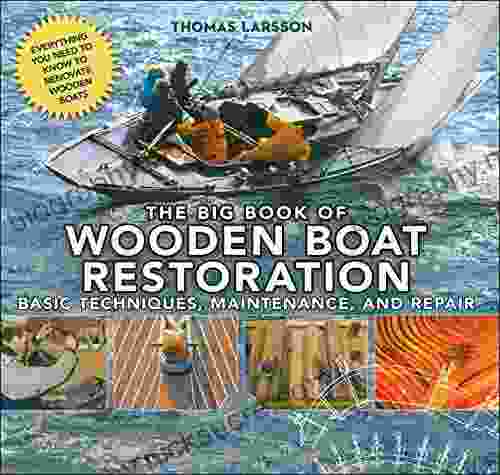
 Dawson ReedThe Big Picture of Wooden Boat Restoration: A Journey of Passion, Precision,...
Dawson ReedThe Big Picture of Wooden Boat Restoration: A Journey of Passion, Precision,... David BaldacciFollow ·13k
David BaldacciFollow ·13k T.S. EliotFollow ·4.8k
T.S. EliotFollow ·4.8k Sam CarterFollow ·7k
Sam CarterFollow ·7k Herman MelvilleFollow ·14.8k
Herman MelvilleFollow ·14.8k Robert BrowningFollow ·2k
Robert BrowningFollow ·2k Isaac MitchellFollow ·4k
Isaac MitchellFollow ·4k Ernest HemingwayFollow ·19.5k
Ernest HemingwayFollow ·19.5k Jerry HayesFollow ·17.1k
Jerry HayesFollow ·17.1k

 Israel Bell
Israel BellEmbark on an Epic 160-Mile Expedition for Charity on the...
Prepare yourself for an...
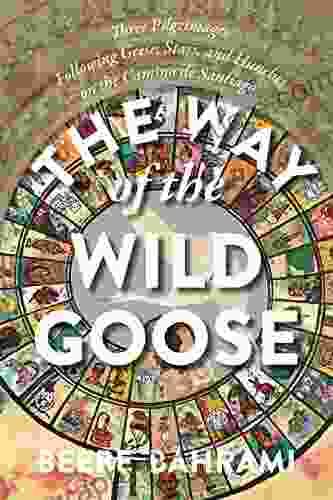
 Josh Carter
Josh CarterThe Way of the Wild Goose: A Journey of Embodied Wisdom...
The Way of the Wild Goose is an ancient...

 Allen Parker
Allen ParkerMastering the Art of Bean Fly Casting: A Comprehensive...
Fly fishing,...
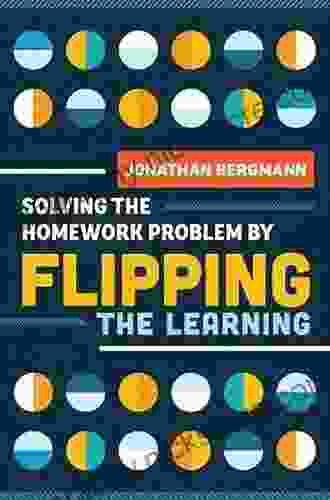
 Aaron Brooks
Aaron BrooksSolving the Homework Problem by Flipping the Learning
What is flipped...

 Fletcher Mitchell
Fletcher MitchellThe Jane Butel Library: A Renewed Source of Knowledge and...
The Jane Butel...
4.6 out of 5
| Language | : | English |
| File size | : | 4207 KB |
| Text-to-Speech | : | Enabled |
| Screen Reader | : | Supported |
| Enhanced typesetting | : | Enabled |
| Word Wise | : | Enabled |
| Print length | : | 192 pages |


